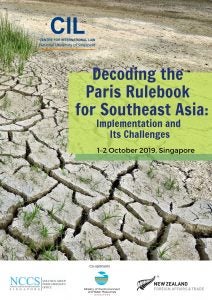Venue
Start
End
Time
Downloads
CIL Workshop on Decoding the Paris Rulebook for Southeast Asia, 1–2 October 2019, Singapore

Background and objectives
Climate change is the single most important problem in this century. As a region, ASEAN shares common interests in mitigating and adapting to climate
change impacts. Some of the most serious concerns facing the ASEAN region today include increasing intensity and frequency of natural disasters, population vulnerability to extreme weather phenomena, and rising sea levels.
In December 2018, the Parties to the Paris Agreement adopted several decisions amounting to a 144-page document, also known as the Katowice Text or Katowice Climate Package. This comprehensive text is a significant milestone, because it fleshes out the implementation details of the landmark Paris Agreement. The COP24 decisions adopted rules and procedures relating to mitigation, transparency, adaptation, finance, the global stock-take, implementation and compliance. While Katowice succeeded in finalising the bulk of the implementation guidelines, a few outstanding issues remain, such as guidance on voluntary cooperation and market-based mechanisms. It is widely recognised that the next steps that are crucial to implementing the Paris Agreement, and there is an urgent need for more action on the ground now. To do so, development of Parties’ capacity to meet their Paris Agreement obligations, for example, the requirements related to producing NDCs, enhanced transparency reporting and participation in the global stock-take, will be key.
This workshop aims to gather legal academics, scientists, public policy-makers and civil society from ASEAN to share their knowledge and best practices on the steps that need to be taken by Parties to fulfil their Paris Agreement obligations and contribute towards global efforts to address climate change. The Paris Agreement and its rulebook also highlight the role of non-Party stakeholders in the climate change regime. Non-party stakeholders include civil society, sub-national actors and the business sector. One of the objectives of this workshop is to serve as a platform to engage non-Party stakeholders.
Participation in this event is strictly by invitation.
Conclusion of workshop

CIL hosted a two-day workshop entitled ‘Decoding the Paris Rulebook for Southeast Asia: Implementation and Its Challenges’ from 1 to 2 Oct 2019. The workshop was attended by nearly 80 policy makers, legal practitioners, academics and civil society from ASEAN countries.
The workshop discussed the common challenges and opportunities presented to ASEAN member states in the implementation of their nationally determined contributions; the nexus between law, science and policy; issues in sustainable climate finance; private sector engagement; transition from the Measurement, Reporting and Verification to the Enhanced Transparency Framework; and the preparations for the Global Stock Take in 2023.


-300x200.jpg)
-300x200.jpg)